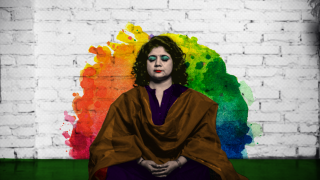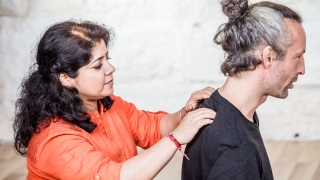
The Wheels Keep Turning: Deconstructing Chakra Names
The goal of this blog post is to give you, the reader, a starting point for building the foundation of your understanding of chakras.

![]() 3 minutes
•
2/22/23
3 minutes
•
2/22/23
As a Yoga student, do you remember your first yoga training, retreat, class— the enthusiasm, dedication, the desire, and eagerness to know it all? Did you also feel it fading away, taken over by the overwhelm of the vast body of knowledge, the confusion over techniques, and comparison with what others are doing, teaching, learning etc.? Did you ever find yourself in doubt or feel imposter syndrome kicking in when it was time to teach?
1. Shama: The ability to maintain calm and avoid being drawn into activities and engagements that agitate, confuse, and overwhelm the mind. For example, being able to discern and choose practices, teachers, books, posts which are meaningful and add to calmness instead of those that draw us into a rabbit hole and create more agitation and confusion.
2. Dama: The ability to recognize and pull back from sensory overload. For example, switching off the screen before sleep pressure goes away or avoiding too much use of incense, essential oil, or recognizing that to teach a Yoga class we do not need to buy multiple mats or Yoga pants.
3. Uparati: The ability of the mind to redirect/pull back from disturbing things, thoughts, and situations even before getting into them. For example, not getting into social media- or in-person arguments related to Yoga.
4. Titiksha: The resilience to sustain the heat of the situation knowing that sometimes the only way out is through it. For example, going through the challenge of learning and memorizing Sanskrit knowing how mirror translation can add to dilution, mis-presentation, and even appropriation at times.
5. Shraddha: The humility borne of discernment and devotion. The undying faith in promise of Yoga. For example, waking up in the morning hours every day to practice meditation and waiting patiently and undoubtedly for the meditative state to become an effortless everyday state.
6. Vairagya: The ability to detach from the sense of accomplishment or failure in Yoga. The ability to let go of the idea of most or least favorite pose, teacher, lineage, practice, training, book. The list is endless, but the practice is simple: idam na mama (this is not mine).
Practice the below three to get the idea around Meditation from Tantras:
* Read Chapter 9: Dhyana: The Sacred Pilgrimage to Self in Yoga: Ancient Heritage, Tomorrow’s Vision.
STAY IN TOUCH
Start your FREE subscription to Indu Arora's newsletter to get more on Yoga and Ayurveda here
Say hello on Instagram
Subscribe to my Youtube Channel.

The goal of this blog post is to give you, the reader, a starting point for building the foundation of your understanding of chakras.

Indu talks about the Ayurvedic healing modality of Marma Therapy for cleansing blocked energy, and how it can help on your healing journey. In conversation with Dr. Avanti Kumar Singh. The Healing Catalyst podcast

Listen to the awakening chants of "Om Namaha Shivaya" in Indu Arora's voice. Read about the importance and special practices to celebrate Maha Shiva Ratri here.
STUDY: Join the ALL ABOUT AUM, 3 Class Series. Begins March 2025. Details here